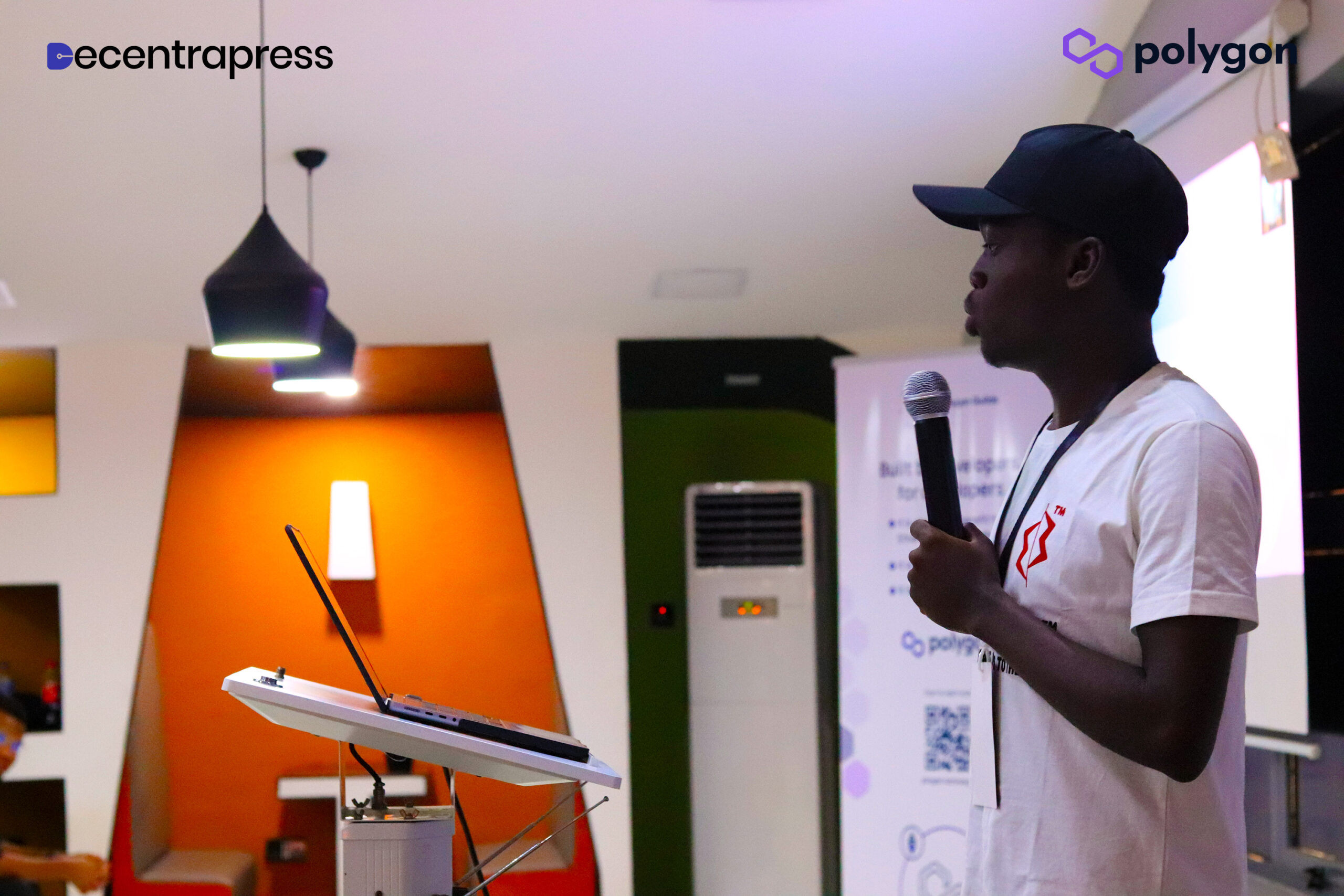Temitayo Daniel is a smart contract developer and a cyber security guy who loves renewable energy and electronics. He is a mentor at Web3Bridge and the African Developer Advocate at Conflux Network Africa. He also writes smart contracts for Aavegotchi. His work is mainly on NFT and DeFi.

Question:
I too have had my own fair share of cybersecurity career. I’m security+ certified. A few months ago, I was preparing for my OSCP to become a Pentester. I wish to know more about your journey as a cyber security expert
Answer:
Okay, I wouldn’t say I am a cybersecurity expert, but I’ll just keep it short. I’ve had my share of doing capture the flags in cybersecurity, where you go to, where people hide bugs in a particular architecture, and it is your job to debug or decrypt some things, and stuff like that, and that is what brought me into cybersecurity. Stuff like phishing and SQL injection. I did not go deep into information security and all of that, but I had my own share of cybersecurity and it was awesome. I wouldn’t say I am an expert because experts are all those people that know what to do and, like, they are the ones that have a lot of experience when dealing with security, especially on a large scale. I just have a little bit of experience in CS and stuff like that.
Question:
Tell me about your role as a mentor at Web3 Bridge
Answer:
At Web3 Bridge, I wouldn’t say I am a mentor, because people have different ways of learning, so I just act as someone who tries to teach what I know to students. Web3 Bridge has cohorts, and we’re currently in the sixth cohort, so I teach them what I know about blockchain development, that includes Solidity, Typescript, or Javascript, writing tests and all of that, and a little bit of normal programming knowledge, so yeah, that’s my role at Web3 Bridge, just like an instructor, that’s a mentor.
Question:
You write smart contracts for Aavegotchi, What does it take to become a smart contract developer
Answer:
I joined Aavegotchi early last year, around March, and yeah, I write smart contracts for Aavegotchi because in Aavegotchi we always deploy upgrades to already written smart contracts. We always write upgrades and make sure that they are actually error-free. Talking about the requirements to become a smart contract developer Writing smart contracts isn’t something you just jump into. You must have prior programming experience, either in writing JavaScript or the equivalent. You must know the different programming paradigms, like looping recursions, OOP and other stuff. So, when you’re writing with solidity, keep those things in mind as you write. Solidity is not like any other language, because everything you do requires gas fees, and that’s money, so you don’t want to start doing expensive operations, especially if you can make them cheaper, so becoming a solidity developer requires a lot of practice and a little bit of experience. It helps to read other people’s solidity codes too.
Question:
How did you make the switch from cybersecurity to Web3
Answer:
For one reason, the switch from cybersecurity to Web3.0 was very easy. That was around 2019 and yeah, I just started hearing the word blockchain, so I did a little searching on it and there were a lot of hackathons, especially by gitcoin, eth global hackathons, and other stuff, so yeah, I did those hackathons and I learnt a lot, (laughs) even though I didn’t really know what I was doing. I learnt a lot by just joining them, even though I didn’t really contribute much. But yeah, I learnt a lot. I would say hackathons helped me transition smoothly into web3. Self-learning was also very important for me. I also did a lot of bounties just to keep my pocket a little bit wet while learning.
Question:
Tell me about your work on DeFi and the projects you have worked on
Answer:
DeFi at Aavegotchi is like a mix of DeFi plus NFTs. I did not really do much on DeFi, but yeah, I have interacted with uniswap contracts, Ave contracts, and some other stuff. It has been awesome. When you work with DeFi contracts, you don’t want to make any mistakes, because in this case, you know you’re toying with real money. You have to make sure you don’t make a big mistake.
Question:
Everyone is talking about NFTs now. Most people still don’t get it. Tell us more about NFTs and your involvement with them
Answer:
Most people think that immediately after you buy an NFT, the image is yours. NFTs do not store their images on the blockchain, they only store a link to where those images are stored, so it is possible that your images are stored on someone else’s computer and the NFTs just point to the person’s computer, so if the person removes it, you won’t see anything. You’ll just have the token, but you won’t see the image anymore. NFTs are here to stay because they have good utility and because they have been able to transfer value to artists and, of course, bring about a lot of communities. Although there are still bad actors that use NFTs for bad or meaningless things, they are still here to stay. You don’t have to NFT everything. You go somewhere and you hear, “I want to turn this into an NFT, I want to make money.” NFT is not a get rich quick scheme at all, it’s just a way for you to tokenise things, then make ownership easily transferrable. That’s all there is to NFTs. I’m very involved with them, I mean, I work at Aavegotchi, so I’m very involved with them and I work with them every day.
Question:
For someone who wishes to break into Web3, what are the steps you suggest they take?
Answer:
For someone who wants to jump into Web3, they need to know what exactly they want to do. When you talk about Web3, we have the non-technical part and the technical part. The technical part consists of the core protocol developer, the smart contract developer, and the frontend developers. The non-technical part is the product manager, community manager, growth manager, product designers, etc., so you identify which one works with you and which one you do not. After that, you look at people who are in that particular position and have already done that and follow them. Look at what they have read and read it. If you’re coming for the technical part, look into papers. If there are a lot of people who have written technical papers, read those papers to gain an insight into what you are actually getting yourself into. If you’re going for the non technical parts, which are the design, product managers, etc, it is better for you to get mentors and start as an intern. That way, you get to have a lot of experience because in this space, experience is better than skill. You need to know how to relate to people and things. That’s all there is to it.
Question:
What programming language do you need to know in order to become a smart contract developer
Answer:
To become a smart contract developer, you need to know solidity. Solidity is not the only language, but it is the most popular and most powerful one. For you to become a good smart contract developer, you should know solidity. If you know JavaScript and you know a little bit of C, solidity is not hard for you to master. Trust me. The syntax is not hard and it is not complex. You also need to learn a little bit of typescript or a scripting language like JavaScript, because you will need to write scripts that interact with your contracts.
Question:
What exactly do you do as the African Developer Advocate at Conflux Network Africa?
Answer:
In Conflux Network Africa/Global, I act as the Africa developer face and I actually help to onboard people to Conflux technically. For example, I’ve been writing some tutorials to help new developers transition into Conflux easily. Conflux itself is a new blockchain. It’s a blockchain on its own that actually offers high transactions per second and very good latency. So yeah, I help with developer documentation and developer onboarding and stuff like that. I also help to bring new people into the ecosystem.
Question:
Tell me more about your love for renewable energy and electronics
Answer:
When you talk about renewable energy and electronics, that was my first love when I was young. I usually interacted or played with all these batteries. Even in university, at 300 level, when I was asked to do an entrepreneur course, I chose solar because it is awesome and I love the principle behind it, because it gets energy from the sun without having to hurt the environment by using generators. It is very cool when you’re able to generate electricity from the sun, because the sun has unlimited energy. The mechanics of that are awesome and I still practice renewable energy; now I can fully install a solar plant in a house (laughs). I have that skill now.
Question:
Do you currently have any mentorship programs
Answer:
I don’t believe in mentorship programs. How do I put it? Mentorship programs are for people who don’t know what they want to do. However, I think people know what they want to do and there’s no reason they should follow someone or there’s a reason for someone to do something just because another person is doing it. Maybe it’s peer pressure or something. I don’t believe in mentorship, but I can help if someone has technical issues or something like that and there’s time. I can definitely help, but mentorship programs are not my thing. When you do mentorship programs, you have to follow up or give the person advice, so I really don’t because it is not my thing.
Question:
Would you like to contribute to www. decentrapress.com on topics you know best?
Answer:
I don’t really like writing, so if it’s possible to talk and you can convert it to writing, then that will be cool. If there are topics and I’m comfortable with I’ll definitely want to contribute to them. Thank you.


